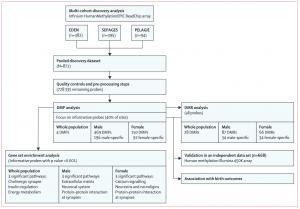Pregnancy and infancy are critical periods when exposure to air pollution can have lasting consequences. This new study explores how air pollution during pregnancy can impact the developing baby through changes in placental DNA methylation, a key factor in gene regulation (Figure 1).

Figure 1: Outline of the study. DMP=differentially methylated position. DMR=differentially methylated region
Outdoor air pollution, particularly particulate matter, is linked to poor birth outcomes such as prematurity and reduced fetal growth. These early-life exposures can also contribute to future health problems like heart disease, respiratory issues, and developmental delays.
While research on the effects of air pollution on the placenta’s epigenome (chemical modifications that influence gene expression) is limited, this study sheds light on how such exposures may alter fetal development. The placenta plays a crucial role in regulating communication between mother and baby. DNA methylation within the placenta acts as a conductor, influencing various physiological processes and ultimately impacting infant development.
Researchers in this multi-site study examined the link between air pollutant exposure during pregnancy and changes in placental DNA methylation. They analyzed data from three large maternal-infant cohorts, focusing on nitrogen dioxide and particulate matter (PM2.5 and PM10) as markers of traffic-related air pollution.
The study employed advanced DNA methylation analysis techniques to identify specific regions of the genome affected by air pollution exposure. Intriguingly, the research revealed a sex-specific aspect to this phenomenon. They found four key regions linked to air pollution exposure in all participants, but a significant difference emerged in the offspring. Female newborns exhibited DNA methylation changes in 150 regions, while males had alterations in 469 regions.
The study also identified critical windows during pregnancy when air pollution exposure may be most detrimental. Female newborns were most susceptible to DNA methylation changes in the third trimester, while males showed sensitivity throughout pregnancy with a peak in the first trimester.
The researchers delved further, investigating the potential health consequences of these DNA methylation changes. Analysis revealed enrichment in pathways related to the immune system, brain development, and metabolism, suggesting potential long-term health risks associated with prenatal air pollution exposure.
This study highlights the potential for sex-specific differences in how air pollution exposure during pregnancy affects infant health. Further research is needed to determine if these epigenetic alterations persist throughout life and explore potential interventions to mitigate the risks associated with prenatal air pollution exposure. Understanding these mechanisms can pave the way for the development of strategies to protect the most vulnerable during this critical period of development.
Journal article: Lucile Broséus et al., 2024. Placental DNA methylation signatures of prenatal air pollution exposure and potential effects on birth outcomes: an analysis of three prospective cohorts, Lancet Planet Health.
Summary by Stefan Botha
